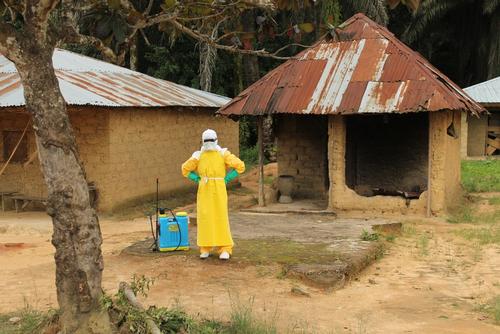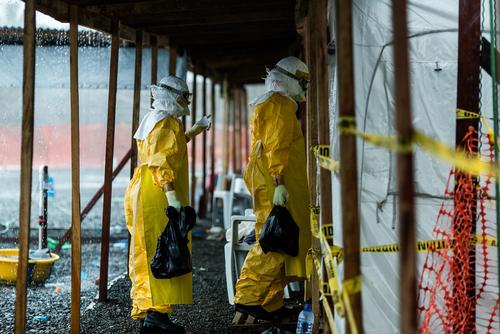This article first appeared in the Washington Post
Six months into the worst Ebola epidemic in history, the world is losing the battle to contain the disease. Leaders are failing to come to grips with this transnational threat.
In West Africa, cases and deaths continue to surge. Riots are breaking out. Isolation centers are overwhelmed. Health workers on the front lines are becoming infected and dying in shocking numbers. Others have fled, leaving people without care for even common illnesses. Entire health systems have crumbled.
It is impossible to keep up with the sheer number of infected people pouring into facilities. Ebola treatment centers have been reduced to little more than palliative-care facilities where people go to die. In Sierra Leone, bodies are rotting in the streets. Rather than building Ebola care centers in Liberia, we are forced to build crematoriums.
Nations neighboring the worst-affected countries are closing their borders. Flights are being stopped, preventing additional relief supplies and health workers from reaching the hot zones.
The World Health Organization (WHO) projected that as many as 20,000 people could be infected over three months in the three worst-affected countries: Liberia, Sierra Leone and Guinea. This number is likely underestimated.
As the president of a medical humanitarian organization that has cared for more than two-thirds of the officially declared infected patients, I can tell you that my colleagues are completely overwhelmed. They are forced to turn away up to 30 infectious people a day.
In the face of this worsening disaster, WHO has delivered a clear road map for Ebola. But huge questions remain about who will implement elements in the plan. Who has the correct training for the tasks that are detailed?
These questions must be answered quickly. We cannot wait.
This Ebola outbreak is akin to a war, claiming lives, destroying communities and perpetuating fear. No country could be expected to manage such a disaster without additional support. We need a large-scale deployment of highly trained personnel who know the protocols for protecting themselves against highly contagious diseases and who have the necessary logistical support to be immediately operational. Private aid groups simply cannot confront this alone.
We appealed for a massive scale-up of isolation and treatment facilities 10 days ago. It is beyond time for countries with biosafety capacity to deploy civilian or military assets. These countries have a political responsibility to use these capabilities in Ebola-affected countries. This deployment must happen within days — not weeks or months.
The mobilization of such threat-containment teams would constitute a surge in trained personnel into hot zones. Their roles would be to immediately scale up the number of isolation centers, deliver protective gear to health workers, deploy mobile laboratories to improve diagnostic capabilities, move personnel and equipment to and within West Africa and build a regional network of field hospitals devoted to treating infected medical personnel.
On Sunday, President Obama said the U.S. government would deploy military assets to establish isolation units and deliver additional supplies. This is an important development, but it must translate into immediate concrete action on the ground. So far, the Pentagon has pledged only one 25-bed unit for Liberia, to be used just for health workers. This is highly insufficient. In Monrovia alone, there is an immediate need for an additional 800 beds of isolation capacity. Other governments must step in in all three of the most affected countries.
One of the biggest obstacles has been restrictions on commercial air traffic. Regional flights in West Africa have virtually stopped, and several carriers have pulled out. Even the U.S. government has been relying on commercial airlines to deliver medical supplies. Civil military air assets should be mobilized to create an air bridge. The flow of aid workers and relief supplies cannot come second to commercial interests of private companies.
This emergency is going to require a sustained mobilization of resources for months to come. To maintain our current staffing levels, we have several hundred staff on standby to rotate into the affected region every six to eight weeks.
Fighting this outbreak goes beyond trying to control the virus. The health system in Liberia has collapsed. Pregnant women experiencing complications have nowhere to turn. Malaria and diarrhea, which are easily preventable and treatable, are killing people. Hospitals need to be reopened, and created.
Lastly, we must change the collective mind-set driving the response to the epidemic. Coercive measures, such as laws criminalizing the failure to report suspected cases, and forced quarantines, are driving people underground, pushing the sick away from health systems. These measures have served only to breed fear and unrest, rather than to contain the virus.
Countries cannot focus solely on measures to protect their own borders. Only by battling the epidemic at its roots can we stem it. This is a transnational crisis, with social, economic and security implications for the African continent.
We cannot cut off the affected countries and hope this epidemic will simply burn out. To put out this fire, we must run into the burning building.





